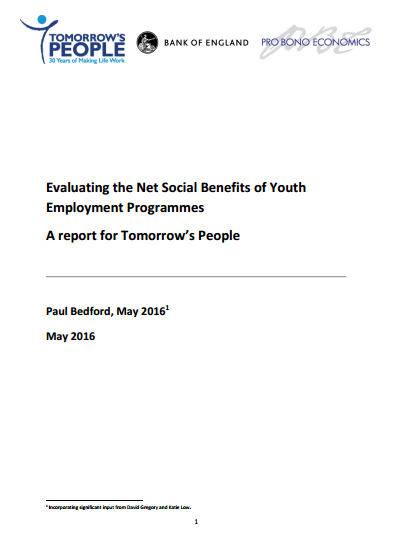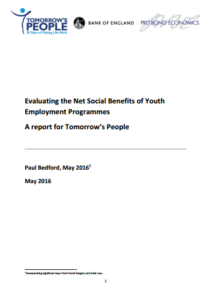Reports Database:
Evaluating the Net Social Benefits of Youth Employment Programmes

 “This report – produced under the auspices of Pro Bono Economics for the national employment charity Tomorrow’s People – evaluates the socio-economic benefits of the Working-It-Out (WIO) programme. Since its introduction in 2007, the WIO programme has helped more than 2,000 socially-disadvantaged young people aged 16-18 find employment or develop new skills through training and education. Our analysis, which updates an earlier study by FTI Consulting, finds that each £1 invested in the WIO programme between 2007 and 2014 has on average delivered economic benefits worth £3.80. This estimate is subject to some uncertainty, but nonetheless presents a strongly positive picture of the WIO programme’s contribution to the lives of the young people that participate in it as well as British society more broadly.
“This report – produced under the auspices of Pro Bono Economics for the national employment charity Tomorrow’s People – evaluates the socio-economic benefits of the Working-It-Out (WIO) programme. Since its introduction in 2007, the WIO programme has helped more than 2,000 socially-disadvantaged young people aged 16-18 find employment or develop new skills through training and education. Our analysis, which updates an earlier study by FTI Consulting, finds that each £1 invested in the WIO programme between 2007 and 2014 has on average delivered economic benefits worth £3.80. This estimate is subject to some uncertainty, but nonetheless presents a strongly positive picture of the WIO programme’s contribution to the lives of the young people that participate in it as well as British society more broadly.
Relative to the FTI study, we use additional data for the period 2012-2014 and also make a handful of methodological adjustments intended to deliver more robust results. These adjustments change both the level and the composition of the economic benefits delivered by the WIO programme, with the result that we estimate a higher benefit-cost ratio than FTI. We also find that the BCR has increased in latter part of our sample period, driven in the main by a significant expansion of the WIO programme – with no dilution in its effectiveness – while costs have been controlled. This is clearly an encouraging finding that suggests the WIO programme continues to develop and respond to changes in the economic environment. Nonetheless, we recommend that, going forward, TP should collect more granular data on the socio-economic characteristics of participants in the WIO programme in order to help identify more accurately the underlying drivers of the estimated BCR and how it evolves over time. It will also be beneficial to collect longitudinal data on the post-programme earnings of WIO participants, as well as their ongoing participation in the labour market, especially as the new national living wage is introduced.
As with all analyses of its kind, our study relies on a number of methodological simplifications and assumptions. The specific way in which the model is calibrated can have a significant impact on the final results, so our estimates should be treated with a degree of caution, especially when considered in an absolute sense. We have more confidence in our analysis of how the BCR has evolved over time, but even in this context small methodological adjustments can have a large impact. Future work could usefully aim to limit the sensitivity of the results to the underlying assumptions, although we recognise that there are practical constraints on what can be achieved while retaining analytical tractability. These methodological limitations should not, however, detract from the headline message that the WIO programme offers genuine economic benefits.”
